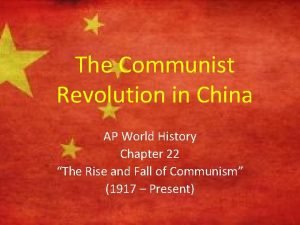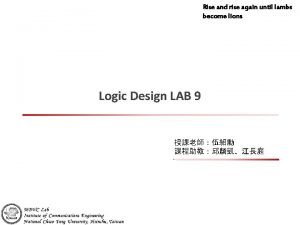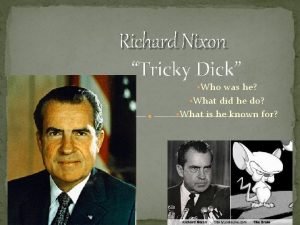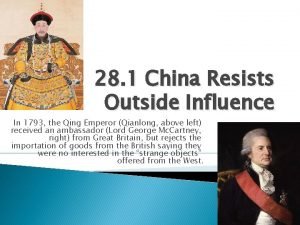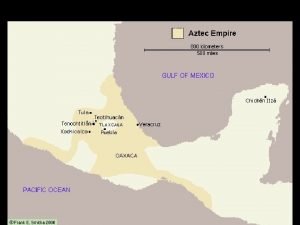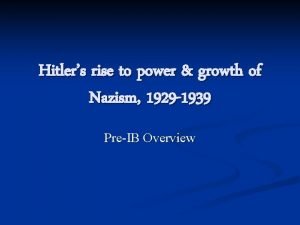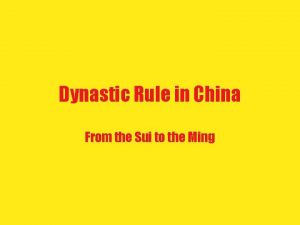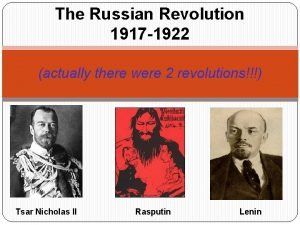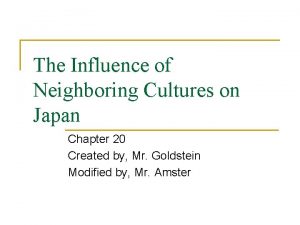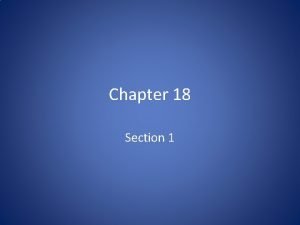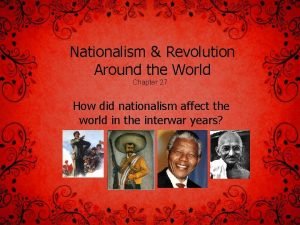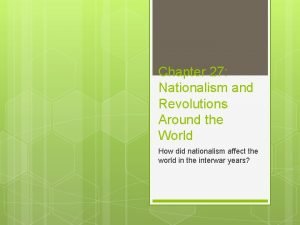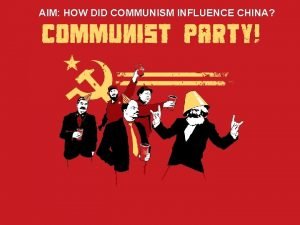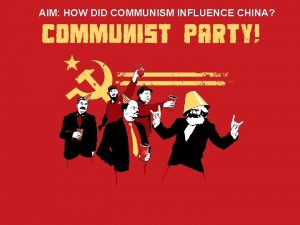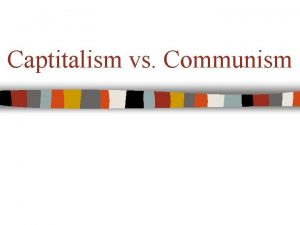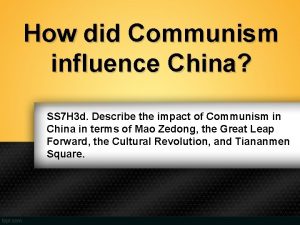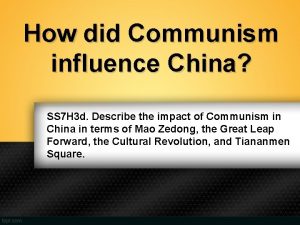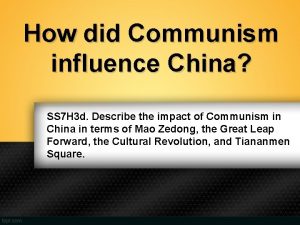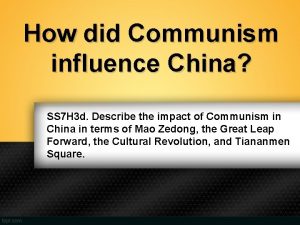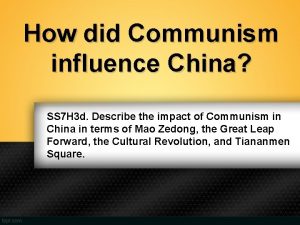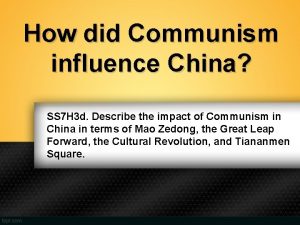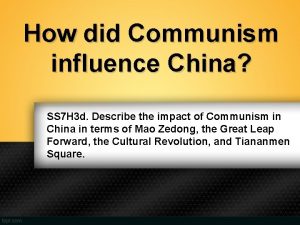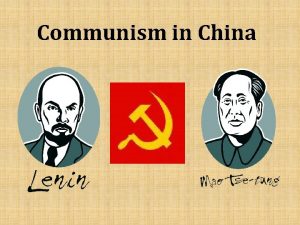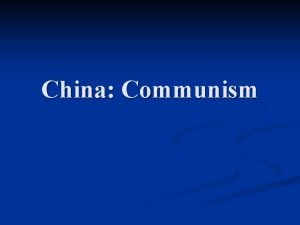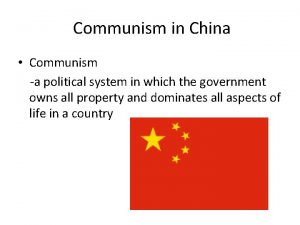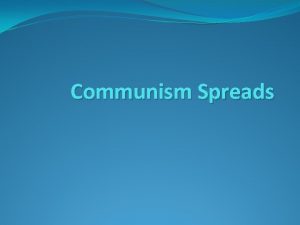AIM HOW DID COMMUNISM INFLUENCE CHINA I RISE


















- Slides: 18

AIM: HOW DID COMMUNISM INFLUENCE CHINA?


I. RISE OF COMMUNISM 1. A CIVIL WAR was fought for four years. 2. 1949 - COMMUNISTS were led by MAO ZEDONG. 3. Communists named mainland China the PEOPLE’S REPUBLIC OF CHINA.

II. MAO TSE-TUNG 1. Collectivized agriculture and industry. 2. Steel production grew rapidly. 3. 1950’s- GREAT LEAP FORWARD: in which large communes were created and aimed at using mainland China's supply of cheap labor to rapidly industrialize the country.

5. 1959 &1961: Poor economic policies and natural disasters caused widespread famine was known as the “THREE YEARS OF DISASTER. ” 6. Lack of production & food caused a massive starvation leading to 15 million deaths in three years. 7. First problem he attempted to fix was the military. China also introduced elements of capitalism. 8. 1964 - China successfully tested its first atomic bomb giving them nuclear powers.

V. THE CULTURAL REVOLUTION 1. Universities were shut down for four years. 2. Students and faculty worked in the fields. 3. Anyone who opposed were arrested or killed. 4. New curriculum included only Communist studies and vocational training. 5. Mao Tse-tung died in 1976, and was replaced by Deng Xiaoping.



Journal Entry Was the Cultural Revolution an aberrant event, unique to China during the 1960 s and 1970 s or is it the type of historical movement that can happen (or has happened) in other times and other places? If it is a unique event, what are the characteristics that make it so? If more universal, what aspects of the Cultural Revolution make it possible that it could happen again in some other historical context?



1. Deng Xiaoping seized power and the Cultural Revolution ended. 2. Four Modernizations: SAID S: Science and Technology A: Agriculture I: industry D: Defense 3. Tried to advance China because they had been isolated for so long 4. Thousands of students were sent abroad to study science, technology, and modern business techniques. VI. DENG XIAOPING


5. Collective farms could now lease lands to peasant families who paid rent. 6. Peasants could now make profit on produce- combining capitalism with communism.

VII. RESULTS 1. 1990 s: Per capita income increased, and more people could afford refrigerators, radios, watches. 2. Democracy was not introduced and those who fought for democracy were sentenced to long terms in prison. 3. 1980 s: Students brought western ideas from their study abroad and challenged government for better living conditions and freedom to choose jobs.

IX. TIANANMEN SQUARE A. MAY 1989 -STUDENT PROTESTS called for an end to CORRUPTION and CHINA’S COMMUNIST LEADERS. B. Demands received widespread support from the people in the cities and led to massive demonstrations in TIANANMEN SQUARE in Beijing. C. Deng ordered tanks and troops into Tiananmen Square to crush the demonstrators: known as the TIANANMEN SQUARE MASSACRE. . 1. HUNDREDS OF PEOPLE WERE KILLED AND THIS WAS A VIOLATION OF HUMAN RIGHTS.

Journal Entry The Tiananmen Square Massacre was a human rights violation. The twentieth century has had many violations of human rights. List THREE other human rights violations of the 20 th century.

 Chinese revolution ap world history
Chinese revolution ap world history Rise and rise until lambs become lions
Rise and rise until lambs become lions Richard nixon tricky dicky
Richard nixon tricky dicky Rise again and again until lambs
Rise again and again until lambs Rise and rise again until lambs become lions origin
Rise and rise again until lambs become lions origin Chapter 12 section 1 china resists outside influence
Chapter 12 section 1 china resists outside influence How did the rise of islam change the lives of women?
How did the rise of islam change the lives of women? Aztec empire
Aztec empire Resurgence of conservatism
Resurgence of conservatism How did hitler rise to power
How did hitler rise to power Whats the dynastic cycle
Whats the dynastic cycle How did vladimir lenin influence the russian revolution
How did vladimir lenin influence the russian revolution King james and shakespeare relationship
King james and shakespeare relationship The influence of neighboring cultures on japan
The influence of neighboring cultures on japan How did the spanish influence ranching in texas
How did the spanish influence ranching in texas Yellow journalism
Yellow journalism Seafaring traders
Seafaring traders Nationalism and revolution around the world
Nationalism and revolution around the world When did mao take over china
When did mao take over china
